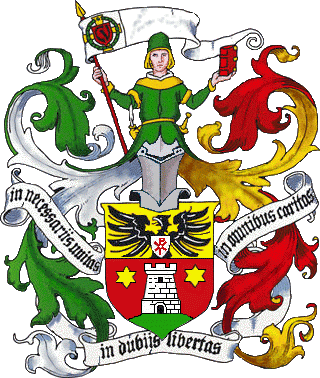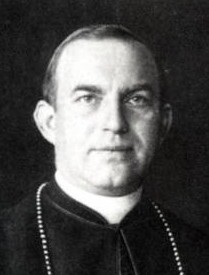Related Research Articles

Boniface, OSB was an English Benedictine monk and leading figure in the Anglo-Saxon mission to the Germanic parts of Francia during the eighth century. He organised significant foundations of the church in Germany and was made bishop of Mainz by Pope Gregory III. He was martyred in Frisia in 754, along with 52 others, and his remains were returned to Fulda, where they rest in a sarcophagus which remains a site of Christian pilgrimage.

Studentenverbindung is the umbrella term for many different kinds of fraternity-type associations in German-speaking countries, including Corps, Burschenschaften, Landsmannschaften, Turnerschaften, and Catholic fraternities. Worldwide, there are over 1,600 Studentenverbindungen, about a thousand in Germany, with a total of over 190,000 members. In them, students spend their university years in an organized community, whose members stay connected even after graduation. A goal of this lifelong bond is to create contacts and friendships over many generations and to facilitate networking. The Lebensbund is very important for the longevity of these networks.

The University of Basel is a public research university in Basel, Switzerland. Founded on 4 April 1460, it is Switzerland's oldest university and among the world's oldest surviving universities. The university is traditionally counted among the leading institutions of higher learning in the country.

The Union of Catholic German Student Fraternities is a German umbrella organization of Catholic male student fraternities (Studentenverbindung).
The Boniface Association, in German Bonifatiuswerk, is a Roman Catholic organization whose primary aim is to support Catholicism in largely Protestant areas of Germany and areas formerly part of the German empire. Founded in 1849 and still in existence, it owes its name to Saint Boniface, traditionally hailed as "The Apostle of the Germans."

Hargesheim is an Ortsgemeinde – a municipality belonging to a Verbandsgemeinde, a kind of collective municipality – in the Bad Kreuznach district in Rhineland-Palatinate, Germany. It belongs to the Verbandsgemeinde of Rüdesheim, whose seat is in the municipality of Rüdesheim an der Nahe. Hargesheim is a state-recognized tourism community.

Konrad Martin was a Catholic Bishop of Paderborn.

The Estonian Students' Society is the largest and oldest all-male academical student society in Estonia, and is similar to the Baltic German student organizations known as corporations (Corps). It was founded in 1870 at Tartu. It has over 900 members in Estonia and abroad.
The Kartellverband katholischer deutscher Studentenvereine is a German academic corporate association with ninety member corporations in Germany, Austria, [Belgium], and Switzerland. As of February 2008, the Alliance represents 16,000 students in Germany alone.

A fraternity or fraternal organization is an organization, society, club or fraternal order traditionally of men associated together for various religious or secular aims. Fraternity in the Western concept developed in the Christian context, notably with the religious orders in the Catholic Church during the Middle Ages. The concept was eventually further extended with medieval confraternities and guilds. In the early modern era, these were followed by fraternal orders such as Freemasons and Odd Fellows, along with gentlemen's clubs, student fraternities, and fraternal service organizations. Members are occasionally referred to as a brother or – usually in a religious context – frater or friar.

AV Turicia is a color-bearing student society in Zürich. It was founded in 1860. It is a section of the Swiss Student Association and a member of the "Federation of Student Komment Societies". It is the oldest university group within the Federation, which was founded in 1841.
Theodor Schieffer was a German historian. He was professor of medieval history at the University of Mainz, then at the University of Cologne, and since 1952 he was president of the Association for Middle Rhine Church History. He is the author of Winfrid-Bonifatius und die christliche Grundlegung Europas, the authoritative biography of Saint Boniface.
The Akademische Orchestervereinigung Göttingen is a symphony orchestra in Göttingen, Germany. It was founded in 1906 by academics of the University of Göttingen.
The Catholic Integrated Community (CIC) was an apostolic community within the Roman Catholic Church according to Decree Apostolicam actuositatem No. 18/19 of the Second Vatican Council. It was recognized by the church in several dioceses in Germany, Austria, Italy and Tanzania,. After an investigation of the community by the Archdiocese of Munich and Freising, Munich Archbishop Cardinal Reinhard Marx dissolved it under canon law in November 2020. In the meantime, most of the German dioceses followed suit and also dissolved the integrated communities.
The German Association of the Holy Land, German: Deutscher Verein vom Heiligen Lande (DVHL), is a Roman Catholic organisation, which aims to strengthen the relationship between Christians in Germany and the Holy Land. DHVL was founded in 1895 in Rhenish Prussia as a legal entity under state protection. The Association's main office is in Cologne.

Carl Josef Thiel was a German organist, church musician and professor of music.

Malkasten is a progressive German artists' association, founded in Düsseldorf in 1848, during the March Revolution. Since 1867, their headquarters have been in the Pempelfort district.
Damenakademies or Ladies Academies were art schools for women in Germany. Prior to the 20th century, careers in art were inaccessible to women, who were denied access to the mainstream academies. While Russia opened its art schools to women as early as 1871, those in Germany remained male-only until the beginning of the Weimar Republic. Apart from the private studios of individual artists, only three large academies, the Ladies Academies (Damenakademies), accepted female students. These institutions were founded through self-help groups in Munich and Berlin and the Artist Academy in Karlsruhe, and offered a limited range of courses.

Hermann Wilhelm Berning was the Roman Catholic Bishop of Osnabrück from 1914 to his death in 1955. Politically, he was a conservative and a German nationalist and his attitude toward the Nazi regime is a matter of controversy among historians.